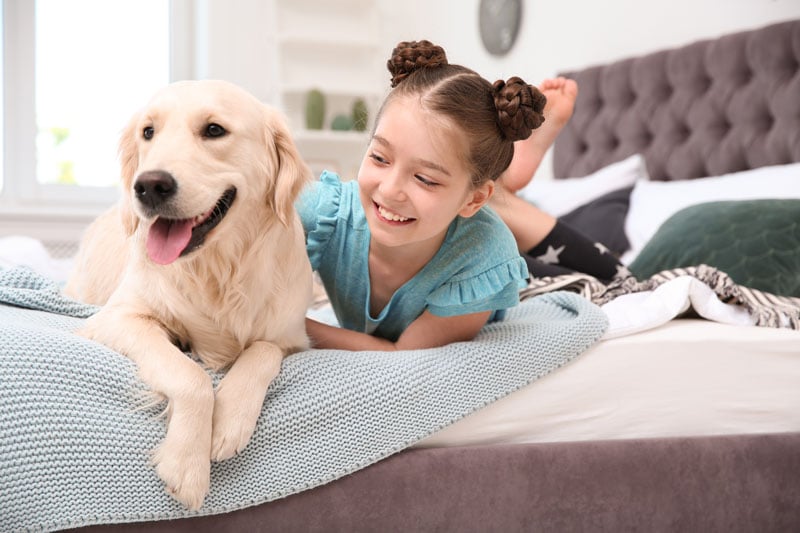Essential oils are more popular than ever, and many pet owners hope to try them for their furry best friends. Advertised as natural cures, oils can replace chemicals in pet products or treat issues like anxiety and skin trouble.
However, natural doesn’t mean all essential oils are safe for dogs. Incorrect treatment or dosage can lead to severe complications. Safety is of the essence. I’ll show you how to use essential oils for dogs, which options are safe, and how often you can treat your pet.
How to Use Essential Oils for Dogs
While not much research is out there on the effectiveness of essential oils, preliminary studies show high-quality oils may offer health benefits for dogs as well as their owners (1). Mainstream vets claim using essential oils for dog fleas or ticks can be problematic. However, holistic vets often use oils in their practices as treatment for things like:
TRUTH BOMB:
You’re
Already killing it!
If You Were More Consistent With Your Wellness Routine, You’d Be Unstoppable.
- Flea and tick prevention
- Skin issues
- Anxiety
There’s not much research on treating illnesses in dogs yet, but the risks can often outweigh the idea of using toxins on our pets.
But are essential oils safe for dogs? First, you’ll need to make sure your dog is right for essential oil treatment. Flat-faced breeds may require more care, for example, as they tend to have respiratory issues.
Whether your dog smells, ingests, or takes in the essential oils through their skin, they’re rapidly absorbed. The dog’s liver then metabolizes the chemicals, so using essential oils on the wrong dog can lead to liver disease. Never use essential oils for:
- Puppies
- Young dogs
- Elderly dogs
- Dogs with liver disease
You should only use essential oils on your pets when needed rather than as a preventative measure for a health problem. Never add oils to their food or drinking water.
To use essential oils for your pet, select the most effective dog-safe option for the issue you want to address. Several essential oils may treat what you want, but some are more beneficial than others. Find the right ones for you by trying out different oil. Make sure to dilute the oils for every use too.
Are Essential Oils Safe for Dogs to Smell?
Most issues in dogs are safely addressed by inhaling diluted essential oils. It’s excellent for stress and relaxation, pain from arthritis or sprains, bruises and scars, and skin issues like eczema or infections.
Dogs rely on their sense of smell, and their noses are much more powerful than people. Thus, aromatherapy is often the way people treat their dogs with essential oils. The aromatic compounds release from a diffuser in your home and move through the air to your pet’s sniffer.
Keep in mind, however, that dogs are more sensitive to smells. A few drops of a therapeutic-grade essential oil is more than enough. Heavily dilute the oils until you know how your pet reacts to them, and always dilute oils for pets – even when inhaling the aroma.
For the best results, I dilute 3-5 drops of the essential oil to 80% with a carrier oil. I place the solution on my hands, rubbing them together, and allow my dog to take a quick sniff before washing my hands. Sometimes I’ll diffuse a bit of lavender for 10 minutes in a water-based diffuser while my dog is fast asleep.
In dog aromatherapy, always use a water-based diffuser or vaporizer. Add 1-2 drops of essential oil and run the machine for no more than 10 minutes. Keep it on the other side of the room from your pet for the best results.
Essential oils that are safe for dogs to smell include:
- Lavender – Promotes calm and relaxation. It’s helpful in conditioning a pet to accept a safe space, making it excellent for dogs with separation anxiety or fear of loud noises like a storm or fireworks. Lavender may also aid insomnia, allergies, burns, ulcers, fleas, or car sickness and anxiety from car rides.
- Vetiver – Similar to lavender, vetiver is also calming. It can reduce stress in dogs who are afraid of loud noises (2).
- Valerian – Beneficial for separation anxiety or fear of loud noises.
- Chamomile – Calms the body and mind, encourages restful sleep, promotes uplifting feelings and tranquility, aids skin health, and eases an upset stomach.
- Cedarwood –
- Sweet Marjoram – A calming aroma, sweet marjoram can keep young unfixed males from displaying undesirable behaviors.
- Frankincense –
- Ginger – Aids motion sickness (perfect for a car diffuser), ingestion, and pain from strains or arthritis.
Diffusing essential oils does more than calm your pet. It can eliminate airborne bacteria and even combat stinky odors. Rather than diffuse the oils, you could also create a room spray to promote feelings of calm or mask stinky dog smells. Fill the spray bottle with 10-15 drops of essential oil, 1 cup of apple cider vinegar, and 1 cup of water.
The best essential oils for dog odor include:
- Lavender
- Myrrh
- Bergamot
- Lemon
- Cedarwood
- Frankincense
Caution: Avoid spraying a room spray or diffusing essential oils near your dog’s food and water bowls. They also shouldn’t be exposed to the oils for a long time or sprayed on their toys or bedding, as they often inadvertently put these items in their mouths. Never apply the spray directly to your pets, no matter how stinky they get.
Essential Oils Safe for Dogs Skin
Seek professional guidance before using essential oils topically on your dog. You should also always make sure the particular oil is dog-safe, as brands and formulas vary. Applying essential oils topically irritates the skin in people easily, and it will be the same for your dog.
You’ll need to dilute the essential oil with a carrier oil, and coconut oil is my favorite for dogs because it helps keep their coat healthy, controls odors, and hydrates the skin. Natural Doggie virgin coconut oil makes an excellent carrier for dogs. Safe carrier oils for pets include:
- Fractionated coconut oil
- Jojoba oil
- Avocado oil
- Aloe Vera
- Sunflower oil
- Apricot kernel oil
- Sweet almond oil
- Borage seed oil
You should only use topical applications for some ailments. If you’re attempting to treat a skin issue, for example, topical application can be counterproductive. The most recommended essential oils for dogs’ skin include:
- Carrot seed – A super gentle oil, carrot seed is ideal in first aid, skincare, and skin conditions. It helps wounds heal and reduces scarring.
- Cedarwood – Kills flea eggs and larvae on contact, aids circulation, and boosts skincare.
- Chamomile – Soothes skin irritation, burns, and allergic reactions in dogs.
- Lavender – Excellent for aromatherapy, lavender can topically aid itchy skin, kill and repel fleas, and stimulate healing.
- Sweet marjoram – Heals bacterial infections in the skin and flesh wounds, repels insects, relaxes dominant male behaviors, and makes an excellent muscle relaxant.
- Myrrh – Repels ticks, calms irritated skin, reduces inflammation, and eases puppy teething pain.
- Rose – Soothes dry and itchy skin, and extremely easy to add a drop to shampoo.
Dilution Ratio for Dogs
Use a single drop of essential oil for 1.5 tablespoons of carrier oil, or a 0.25% dilution ratio. This amount is diluted enough to make the solution mild and agreeable to pets.
Dilute for the dog’s size as well. A larger dog may react much differently than a teacup pet. Before applying essential oils topically for the first time, always test a small patch.
Topical Flea Cures
The best essential oils for dog fleas are lavender, lemongrass, and rose geranium oil. Neem oil is my go-to for a flea and tick carrier oil I can massage into the skin.
Is cedarwood oil safe for dogs? Cedar oil, aka cedarwood, makes another perfect repellent you can mix in with your carrier oil, as it both kills and repels fleas and ticks from your pet and home. It also supports healthy skin and relaxes itchy dogs.
Create a flea collar with 3 drops of lavender, 1-2 drops of lemongrass, and 1-3 tablespoons of water. Dilute the oils and drop the mixture onto a bandana, tying it around your dog’s neck once per week for preventative measures.
Or, you can dab a drop of rose geranium oil directly on your dog’s shoulder blades and another near the base of the tail.
For a homemade flea spray that you can mist directly on your dog, combine a cup of white distilled vinegar with a cup of apple cider vinegar, a quart of water, and 2 drops of lavender oil in a spray bottle. Mist your dog, avoiding the face, or use a cloth to wipe on the mixture. It’s safe to spray on your dog’s bedding as well.
Fleas around the tail can be treated by combining 1-2 drops of lavender oil with a tablespoon of olive oil. Dab the mixture around the base of your pet’s tail.
Caution: Be careful with essential oils on dog skin. Never apply the oil to an area your pet can lick and avoid stroking your pet near the area you apply the oil. If the dog can lick off the oils, it could cause problems in the gastrointestinal tract. Dogs, like people, should never ingest essential oils straight. In the event that your dog ingests oils, immediately contact poison control or your vet.
Essential Oils Safe for Dogs
There are some essential oils with conflicting information out there about their safety for use on dogs. If you’re wondering, “Is patchouli oil safe for dogs?” The answer is yes. Patchouli is misunderstood, but it can be used to help ground hyperactive and fearful dogs (3), and it’s especially helpful with animals who have gone through trauma or abuse.
The popular essential oils safe for dogs include:
- Angelica Root
- Basil
- Bergamot
- Black Pepper
- Cardamom
- Chamomile
- Coriander
- Sweet fennel
- Frankincense
- Geranium
- Ginger
- Lavender
- Myrr
- Sweet marjoram
- Nutmeg
- Patchouli
- Rose
- Sandalwood
- Tangerine
- Valerian
- Vanilla
- Vetiver
Oils to Avoid with Pets
Using the wrong essential oils with your pets can cause changes in behavior, respiratory issues, and adverse effects in the central nervous system. Observe your pet carefully, and stop use immediately and take your pet outside if your pet seems uncomfortable, become anxious, or acts lethargic or distressed.
The essential oils that are poisonous to dogs include:
- Anise
- Sweet birch
- Cassia
- Cinnamon
- Citrus
- Citronella
- Clove
- Cypress
- Eucalyptus
- Garlic
- Grapefruit
- Lemon
- Lime
- Juniper
- Orange
- Oregano
- Pennyroyal
- Peppermint
- Pine
- Rosemary
- Spearmint
- Tea tree
- Thyme
- Wintergreen
- Wormwood
- Yarrow
- Ylang-ylang
Is diffusing peppermint oil safe for dogs? No. All mint-like oils should be avoided in pets. Not only should these oils never be applied topically or ingested by your pet, but it’s also better if you avoid hot, cooling, spicy, or intense aromas around pets altogether.
You can also swap out unsafe oils with pet-friendly alternatives. Try using Myrrh instead of Tea Tree and Frankincense rather than Wintergreen.
Essential Oils Safe for Cats and Dogs
If you have both cats and dogs, you want to use essential oils that you won’t have to worry about around your pets. Cats and essential oils don’t mix so well.
Luckily, companies like DoTerra have a few options safe for pets. Add 4-5 drops of essential oil in a water-based diffuser for the best results with pets. My favorite DoTerra essential oils for pets include doTerra DigestZen for digestive support, doTerra On Guard for immune support, and doTerra Breathe for respiratory support.
For the best results, speak with your vet. They will know which essential oils are safe for your specific pet, based on their needs and any other medications they may already take. A trained holistic vet can also let you know how to dilute the essential oils for your pet correctly and how frequent a dose you should use.
Start small, using small doses infrequently, until you know how your pet will react. Never attempt internal use without consulting a vet and be very careful with topical application to treat a dog’s skin. It’s better to err on the side of caution and stick with aromatherapy.
Sources
- Kidd, Randy. (2008). Aromatherapy (Proceedings). Retrieved from: http://veterinarycalendar.dvm360.com/aromatherapy-proceedings?id=&pageID=1&sk=&date=
- Puotinen, C.J. (2004). Whole Dog Journal. Therapeutic Essential Oils for Your Dog. Retrieved from: https://www.whole-dog-journal.com/care/therapeutic-essential-oils-for-your-dog/
- Henriques, Julia. Dogs Naturally. Three Essential Oil Recipes for Fearful Dogs. Retrieved from: https://www.dogsnaturallymagazine.com/essential-oils-for-scared-dogs









Good information once again. Thanks=)